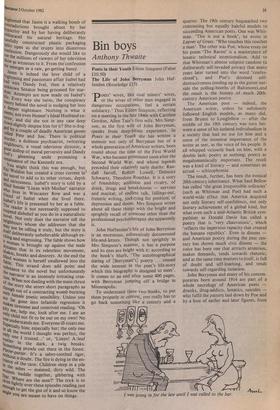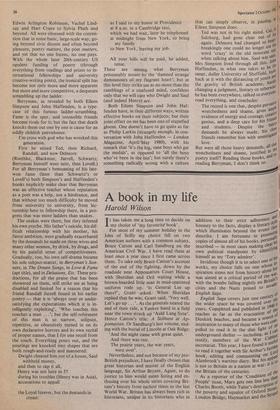Bin boys
Anthony Thwaite
The Life of John Berryman John Haf- fenden (Routledge £15)
wives, like coal miners' wives,
or the wives of other men engaged in dangerous occupations, feel a certain solidarity.' Thus Eileen Simpson, reflecting on a meeting in the late 1940s with Caroline Gordon, Allen Tate's first wife. Mrs Simp- son, as the first wife of John Berryman, speaks from deep-bitten experience. In Poets in their Youth she has written a memoir not only of Berryman but of a whole generation of American writers, born round about the time of the First World War, who became prominent soon after the Second World War, and whose legends preceded their relatively early deaths: Ran- dall Jarrell, Robert Lowell, Delmore Schwartz, Theodore Roethke. It is a story of friendship; ambition and rivalry, of drink, drugs and breakdowns — nervous and marital; of endless talk, fallings-out, frenetic writing, jockeying for position; of depression and doom. Mrs Simpson writes about all these things with the bright and sprightly recall of someone other than the professional psychotherapist she apparently is.
John Haffenden's life of John Berryman is an enormous, exhaustively documented life-and-letters. Though not sprightly in Mrs Simpson's manner, it has a purpose and its eyes are bright with it: according to the book's blurb, 'The autobiographical daring of [Berryman's] poetry ... roused the wide interest in the poet's life-story which this biography is designed to meet'. It comes to an end after some 400 pages, with Berryman jumping off a bridge in Minneapolis.
To understand these two books, to put them properly in context, one really has to go back something like a century and a
quarter. The 19th century bequeathed two contrasting but equally baleful models to succeeding American poets. One was Whit- man. 'This is not a book', he wrote in Leaves of Grass. 'Who touches this touches a man'. The other was Poe, whose essay on his poem 'The Raven' is a masterpiece of lunatic technical intentionalism. Add to that Whitman's almost solipsist candour (a deliberately self-invaded privacy that many years later turned into the word 'confes- sional'), and Poe's doomed self- destructiveness (ending up in the gutter out- side the polling-booths of Baltimore),and the result is the history of much 20th- century American poetry.
The American poet — indeed, the American writer, unless he sedulously followed English models, as many did, from Bryant to Longfellow — after the middle of the 19th century was torn bet- ween a sense of his isolated individualism in a society that had no use for him and a sense of the immense importance of the writer as seer, as the voice of his people. It all whipped viciously back on him, with a double lash: poetry as nothing; poetry as megalomaniacally important. The result was a kind of literary — and sometimes an actual — schizophrenia.
The result, further, has been the ironical 20th-century inheritance. What Saul Bellow has called 'the great irrepressible solitaries' (such as Whitman and Poe) had such a world-wide effect that America acquired not only literary self-confidence, not only literary achievement of a global kind, but what even such a mid-Atlantic British sym- pathiser as Donald Davie has called a poetry that is 'very chauvinistic', which `reflects the imperious rapacity that created the banana republics'. Even in dissent and American poetry during the past cen- tury has shown much civic dissent — the voice has been one that attracts attention, makes demands, tends towards rhetoric; and at the same time mutters to itself, is full of doubt and self-loathing, and tends towards self-regarding isolation.
John Berryman and many of his contem- poraries born around 1914 are part of a whole necrology of American poets drunks, drug-addicts, lunatics, suicides who fulfil the pattern laid down by Poe and by a host of earlier and later figures, from I was going in for the law until I was called to the bar. Edwin Arlington Robinson, Vachel Lind- say and Hart Crane to Sylvia Plath and beyond. All were obsessed with the conten- tion that in some basic, large-scale way, go- ing beyond civic dissent and often beyond pleasure, poetry matters, the poet matters, and yet that no one listens, no one pays. With the whole later 20th-century US opulent funding of poetry (through everything from readings and prizes to in- ternational fellowships and university creative-writing posts), the ironical split has become not only more and more apparent but more and more competitive, a desperate scrambling up the ladder.
Berryman, as revealed by both Eileen Simpson and John Haffenden, is .a type- case of this furious ladder-scrambling. Fame is the spur, and ostensible friends become rivals for it; but the fact that death knocks them out one by one is cause for an oddly childish peevishness: I'm cross with god who has wrecked this generation.
First he seized Ted, then Richard, Randall, and now Delmore.
(Roethke, Blackmur, Jarrell, Schwartz; Berryman himself went next, then Lovell.) For all Berryman's bemoaning of his late- won fame (later than Schwartz's or Lovell's) both Simpson's and Haffenden's books implicitly make clear that Berryman was an effective teacher whose reputation as a poet was a help, not a hindrance, and that without too much difficulty he moved from university to university, from lec- tureship here to fellowship there, in a pro- gress that was more ladders than snakes.
The snakes were there, but they infested his own psyche. His father's suicide, his dif- ficult relationship with his mother, his fierce ambition, were gradually exacerbated by the demands he made on three wives and many other women, by drink, by drugs, and by his painful sense of competitiveness. Gradually, too, his own self-drama became his sole subject-matter, in Berryman's Son- nets, in The Dream Songs, in Love & Fame (apt title), and in Delusions, Etc. These pro- ductions, for all the praise that has been showered on them, still strike me as being disabled and limited for a reason that his friend Randall Jarrell found in his earlier poetry — that it is 'always over or under- satisfying the expectations which it is in- telligently exploiting'. 'Who touches this touches a man ...'; but the self-referment of this man is so narrow, solipsist, repetitive, so obsessively turned in on its own declarative horrors and its own recital of proper names, that I for one recoil from the touch. Everything pours out, and the pourings are knocked into shapes that are both rough-and-ready and mannered: Dwight cheated him out of a house, Saul withheld money, and then to cap it all, Henry was not here in 57 during his troubles (Henry was in Asia), accusations to appall .
the Loyal forever, but the demands in creast: as I said to my house in Providence at 8 a.m. in a Cambridge taxi, which we had wait, later he telephoned at midnight from New York, to bring my family to New York, leaving my job.
All your bills will be paid, he added, tense.
These are among what Berryman presumably meant by the 'damned strange' demeanours of my flagrant heart'; but at this level they strike me as no more than the ramblings of a confused mind, confident only that we will care who Dwight and Saul (and indeed Henry) are.
Both Eileen Simpson and John Haf- fenden have, in their different ways, written effective books on their subjects; but their joint effect on me has been one of stupefied gloom. One doesn't have to go quite as far as Philip Larkin (strangely enough, in con- versation with John Haffenden — London Magazine, April/May 1980), with his remark that 'it's the big, sane boys who get the medals', as opposed to 'all the boys who've been in the bin'; but surely there's something radically wrong with a culture that can simply
Eileen Simpson observe, in2 passing :
ileen Simpson does: Ted was not in his right mind. Cal, ie.
Salzburg, had gone clear out of ills again. Delmore had changed so hearut.
breakingly one could no longer use the word 'crazy' in the old innocent O.)
when talking about him. Saul was sane' Mrs Simpson lived through all this. J°11,.° Haffenden, in what one takes to be we saner, duller University of Sheffield, 101 back at it with the distancing of youth ail" the gravity of British academe, har(11,3. changing a judgment, literary or others's' he has been everywhere, talked to everYnrie' read everything, and concludes: The record is one that, despite pervasiviee wretchedness and shame, gives atrip,. evidence of energy and courage, creanic genius, and a deep care for his friends , and students. Despite the heavy demands he always made, his close iforiveends remember him with unmitigated love.
were all those heavy demands, all at
th wretchedness and shame, justified in e poetry itself? Reading those books, and to reading Berryman, I don't think so.







































 Previous page
Previous page